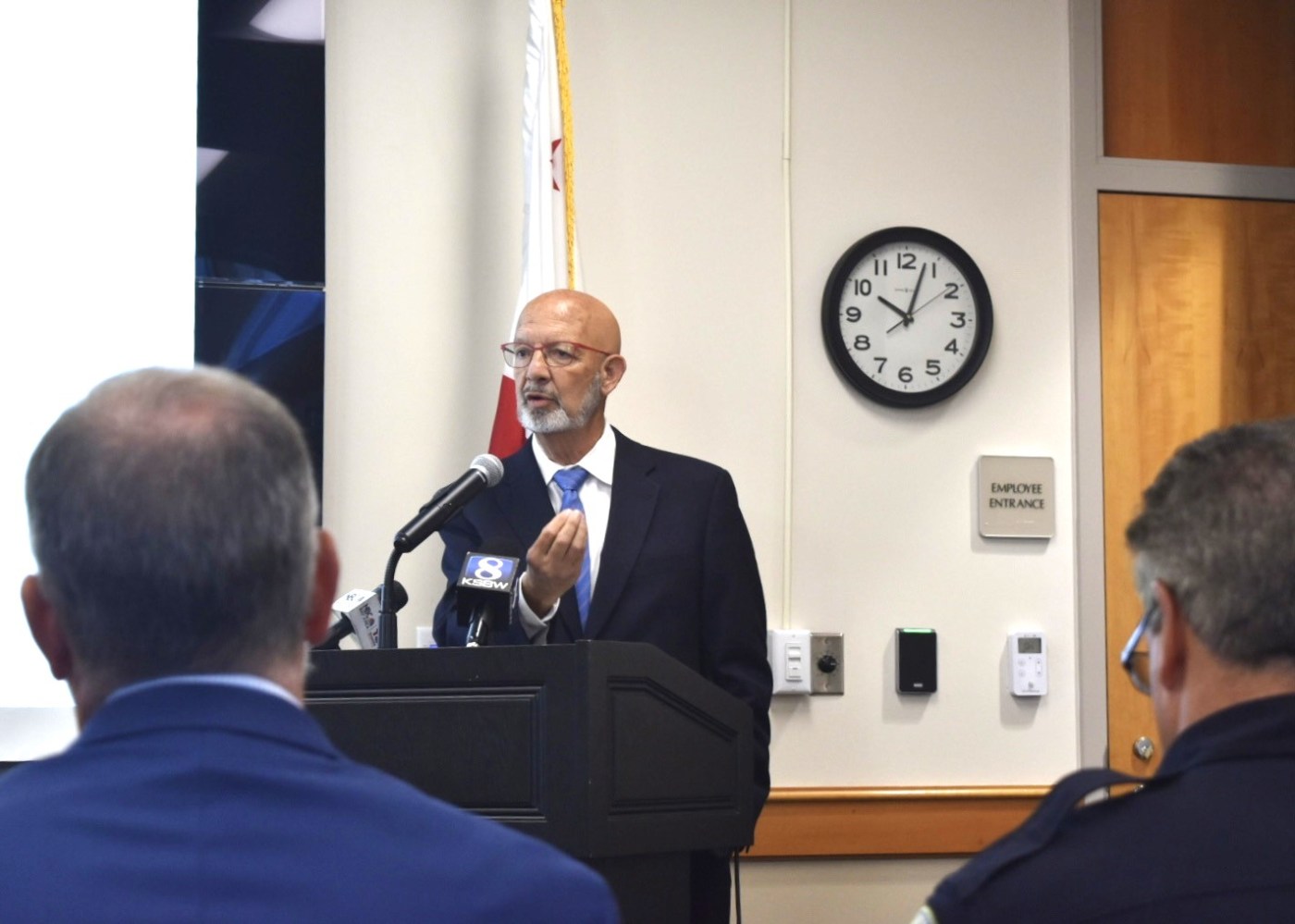SANTA CRUZ — After months of purported efforts to play nice, the city of Santa Cruz is taking a hard line on the “inhumane” alleged unsolicited drop-off of a homeless person by two San Joaquin Valley police officers.
Santa Cruz Mayor Fred Keeley, joined by two members of the Santa Cruz City Council, held a press conference Thursday at the Santa Cruz Police Department announcing a proposed ordinance before the full council Tuesday that would criminalize a government agency’s unsanctioned transport of homeless people into the city. A companion resolution, if approved, would direct the Santa Cruz Police Department to update its policy such that its officers similarly would not conduct unsanctioned transport to outside jurisdictions, which Keeley said has not occurred historically.
Should the new Santa Cruz ordinance be instated, apprehended outside police officers or other government representatives could be fined and charged with a misdemeanor for breaking the law, City Attorney Tony Condotti said. As for enforcement of such a law, Keeley said he expected the passage of such a law to serve as a deterrent as much as a punishment, since officers were unlikely to announce their arrival in town with their lights and sirens on.
The proposal comes amid Santa Cruz’s struggles to address homelessness using outreach and shelter options paired with frequent street and green space encampment sweeps. The catalyst for the new ordinance, however, was a woman city officials said was dropped off June 27 outside the city-funded Overlook shelter in the National Guard Armory in DeLaveaga Park. The woman, officials said, is experiencing homelessness and lives with an undisclosed disability.
Related Articles
Editorial: Prop. 36’s smart response to crime, addiction, homelessness
Can AI help solve homelessness? Gov. Newsom thinks so
San Jose to build its first safe sleeping site near Watson Park in effort to move hundreds of homeless residents
Tiny homes housing vs. jail diversion sparks a fresh round of neighborhood outrage in San Jose
This Bay Area county made refusing a shelter bed a crime. Is it helping solve homelessness?
Touting Santa Cruz County’s overall dip in estimated street homelessness and the city of Santa Cruz’s additional progress in the past two years, Keeley said the city could ill-afford to become a go-to drop-off site for other cities. The resolution before the council next week will urge city staff members to continue the city’s “current practice of reserving city-funded and city-managed shelter resources for persons experiencing homelessness that are currently residing in the city of Santa Cruz.”
“When we look inside those numbers, it says the majority of folks experiencing homelessness were housed in Santa Cruz before they became homeless and they became homeless because they lost their job,” Keeley said Thursday. “We feel an obligation to those folks, first and foremost. The others who come into our community (who) weren’t sent here by some other government, we receive folks the way they arrive, like all communities do. What we’re trying to nip in the bud is this shirking of responsibility by one jurisdiction, by shifting the obligation to care for that person to us.”
The city of Hanford Police Department invited the woman, formerly of Las Vegas, to come to its station so as to drive her — and her possessions — three hours out of town, according to details she reportedly provided to city officials. The effort, according to a Santa Cruz city outline of events, was part of a program similar to one locally dubbed “Homeward Bound,” where bus tickets are provided to people who have an established contact, program or housing in a different jurisdiction. The woman in question, however, had no ties or support system with Santa Cruz or its human services programs, officials said. The Hanford officers initially attempted to drop the woman off in a shopping center parking lot off Highway 17 but allegedly were deterred by a passing Santa Cruz police vehicle, officials said. She then used an officer’s phone to contact the Homeless Garden Project and Housing Matters before being referred to the Salvation Army-operated Overlook.
“Person Doe asked to be relocated to one of three out-of-state locations,” according to Tuesday’s city meeting agenda report. “Instead, the Hanford PD officer recommended going to Santa Cruz as he described the community as more, ‘laid back and tolerant of people experiencing homelessness’ and stated ‘[t]hey are anti-homeless in Hanford.’”
While rumors of similar illicit transport of homeless people by outside law enforcement into Santa Cruz have cropped up over time, this occasion was the first Keeley knew of to be witnessed and documented. Santa Cruz County Supervisor Justin Cummings, whose district includes part of the city of Santa Cruz, said Thursday that he intended to broach the introduction of a similar ordinance to his supervisorial peers during a six-month homelessness strategic plan update Tuesday.
Keeley, Police Chief Bernie Escalante and others reached out to their Hanford counterparts to express their displeasure, they said Thursday.
In a prepared statement issued by the city of Hanford Thursday in response to media inquiries, city Community Relations Manager Brian Johnson wrote that the woman repeatedly had refused local homeless services and confirmed that Hanford officers had driven her to Santa Cruz. The woman, he said, requested to travel to several unfeasible locations, such as Hawaii. She later arrived at the police department requesting relocation to Santa Cruz, he wrote, after having done some research at a local library and finding a shelter in the city.
“At no point in time did Hanford Police Department officers suggest, encourage or coerce the individual to go to the City of Santa Cruz,” Johnson wrote. “Any claims of this nature are flat-out false.”
Hanford, population 59,000, is the county seat of Kings County, a drive of nearly 200 miles northwest to Santa Cruz.












